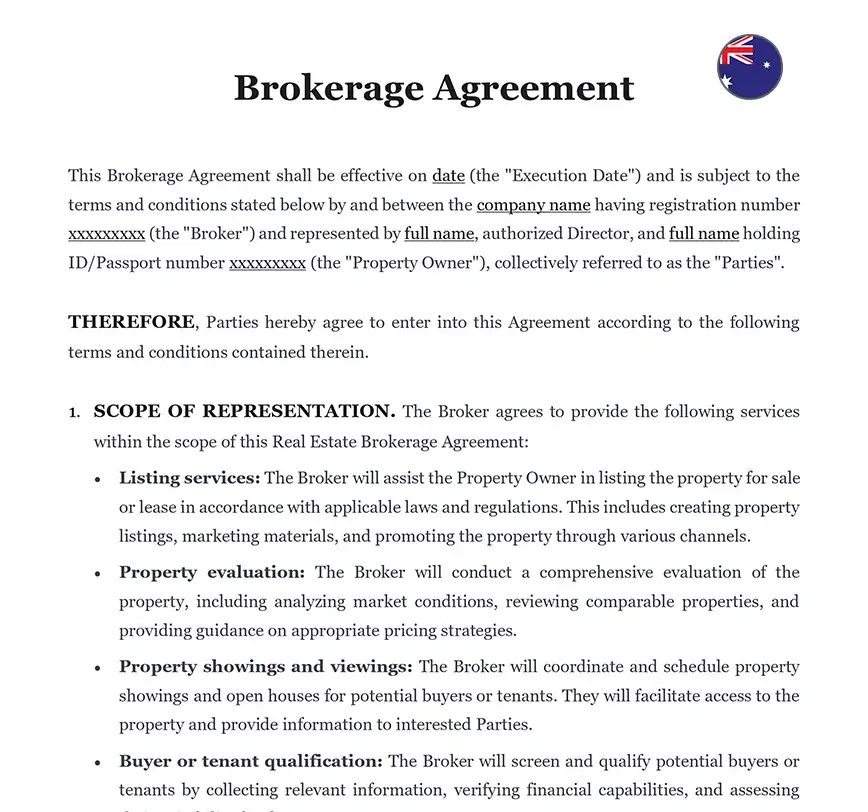Ready to use legal template
Drafted by experienced lawyers
Compliant with Australian law
Ready to use legal template
Drafted by lawyers
Compliant with Australian law
Home › Buy a property › Brokerage Agreement
Learn more about Brokerage Agreement in Australia
A Brokerage Agreement is a legal contract between a broker and a client in Australia, establishing the terms and conditions of their professional relationship regarding brokerage services. This agreement typically outlines the scope of services provided by the broker, including marketing, negotiation, and facilitation of transactions on behalf of the client. It also specifies the commission or fee structure, duration of the agreement, and any other relevant terms. Our easy-to-edit templates streamline the document preparation process, ensuring that you have professionally crafted documents at your fingertips, ready to be customized to your unique needs.
Table of contents
-
What legal requirements govern the drafting of Brokerage Agreements in Australia?
-
How does a Brokerage Agreement define the roles and responsibilities of brokers and clients
-
What key components should be included in a Brokerage Agreement?
-
Are Brokerage Agreements legally enforceable documents in Australia?
-
What role does a Brokerage Agreement play in the context of brokerage services in Australia?
-
Can parties negotiate the terms of a Brokerage Agreement to suit their specific needs and preferences ?
-
What legal considerations should brokers and clients keep in mind in Australia?
-
What are the rights and responsibilities of both parties into a Brokerage Agreement in Australia?
What legal requirements govern the drafting of Brokerage Agreements in Australia?
Brokerage Agreements in Australia are governed by various legal requirements, including statutory regulations, industry standards, and common law principles. These agreements must comply with applicable laws such as the Australian Securities and Investments Commission (ASIC) Act, Corporations Act, and relevant state or territory legislation governing real estate or financial services. Additionally, brokerage agreements may be subject to regulatory oversight by professional bodies or industry associations, such as the Real Estate Institute of Australia (REIA) or the Australian Securities Exchange (ASX). Compliance with legal and regulatory requirements ensures transparency, fairness, and accountability in brokerage transactions and protects the rights and interests of both brokers and clients.
How does a Brokerage Agreement define the roles and responsibilities of brokers and clients in Australia?
Brokerage Agreements in Australia define the roles, responsibilities, and obligations of brokers and clients involved in brokerage services. These agreements outline the scope of brokerage services to be provided, including specific tasks, deliverables, and performance standards expected from the broker. Responsibilities of brokers may include marketing the client’s property or financial products, negotiating transactions, providing advice or recommendations, maintaining confidentiality, and complying with relevant laws and regulations. Clients, on the other hand, are typically responsible for providing accurate information, cooperating with the broker, paying agreed-upon fees or commissions, and making decisions regarding the transaction. Clear delineation of roles and responsibilities minimizes misunderstandings, mitigates risks, and fosters a productive working relationship between brokers and clients.
What key components should be included in a Brokerage Agreement?
To ensure compliance with Australian brokerage laws and regulations, Brokerage Agreements should include key components such as:
| ➤ Identification of parties: Clearly identify the broker(s) and client(s) entering into the agreement. |
| ➤ Scope of services: Define the specific brokerage services to be provided, including any limitations or exclusions. |
| ➤ Fees and commissions:Specify the amount, method, and timing of payment for brokerage services, including any conditions or contingencies. |
| ➤ Duration and termination:Determine the term of the agreement, renewal provisions, and procedures for termination or cancellation by either party. |
| ➤ Compliance with laws:Include provisions ensuring compliance with applicable laws, regulations, and ethical standards governing brokerage activities. |
| ➤ Dispute resolution:Establish mechanisms for resolving disputes or disagreements arising from the brokerage relationship, such as mediation, arbitration, or litigation. |




